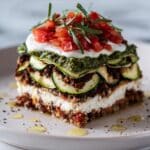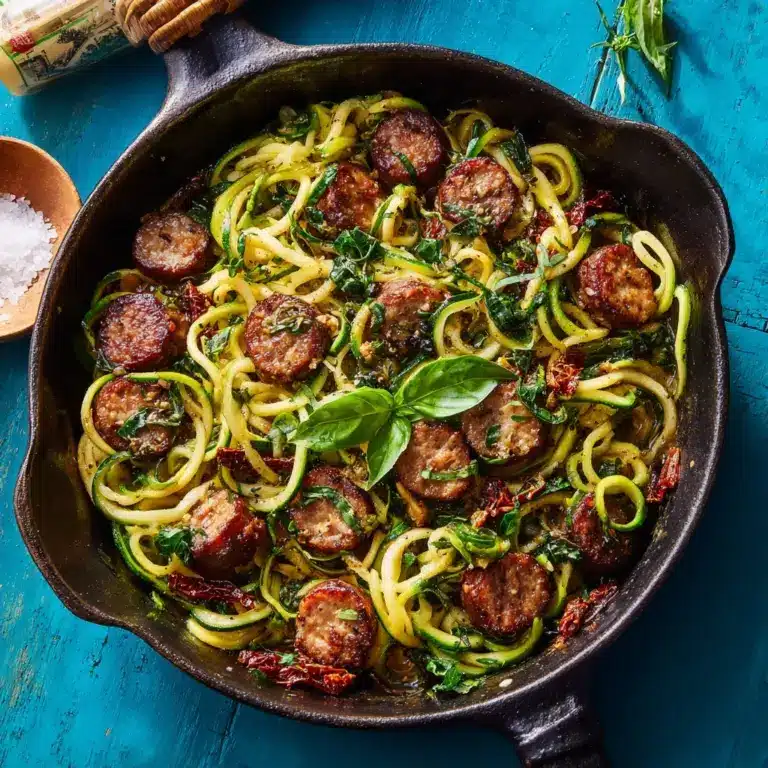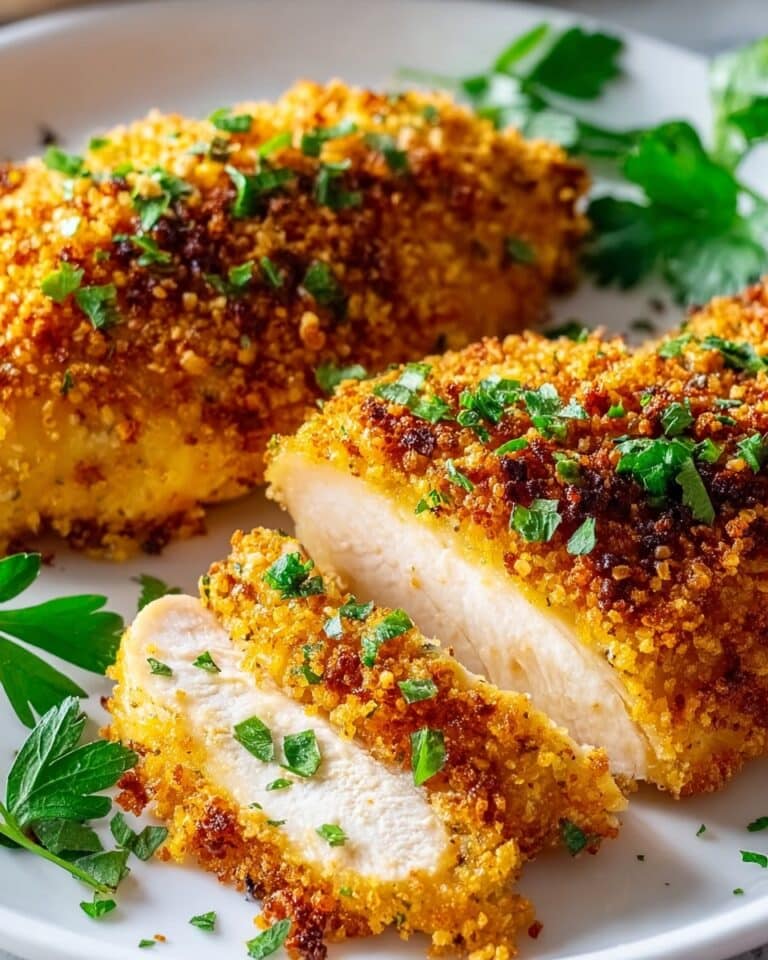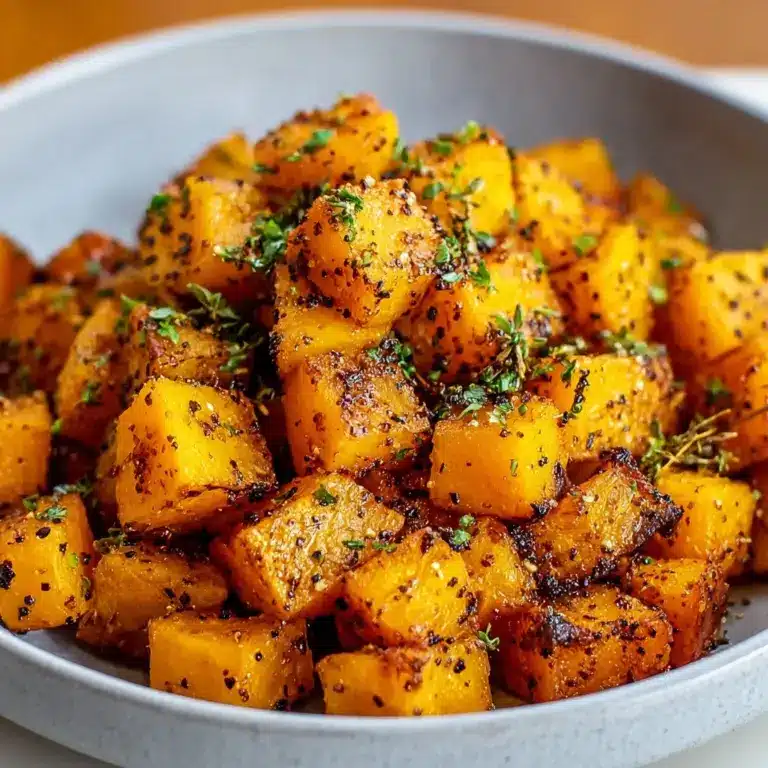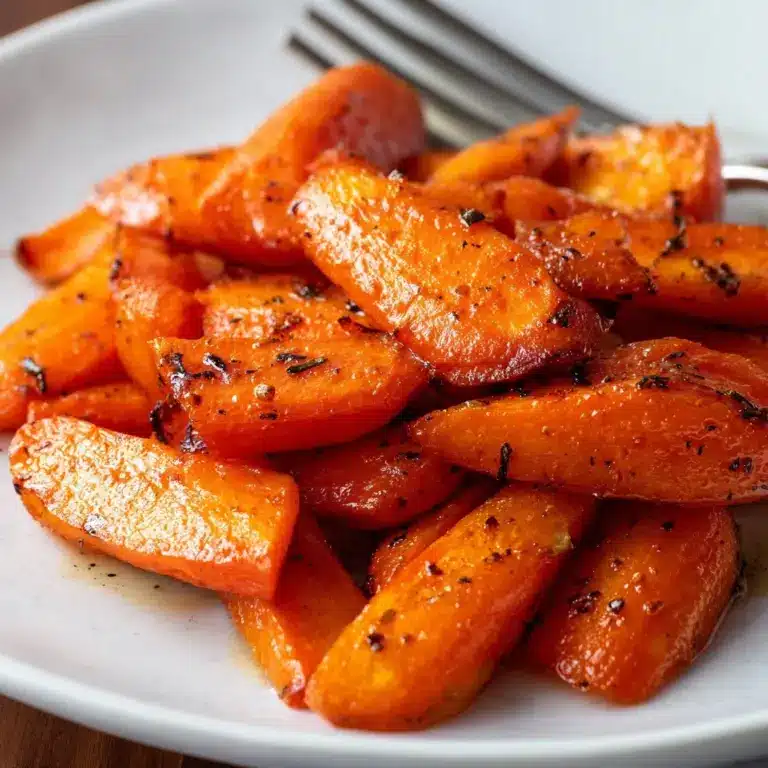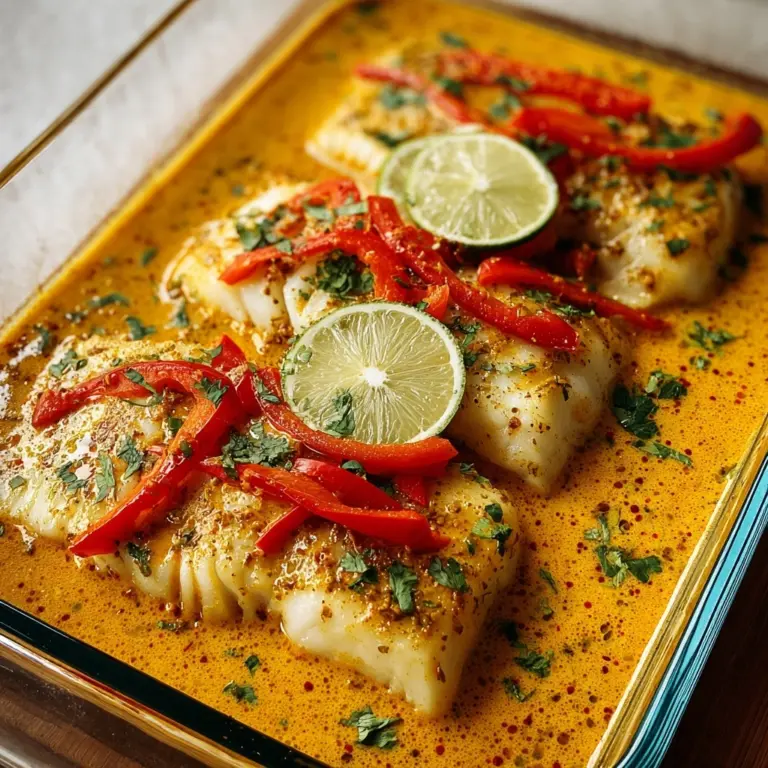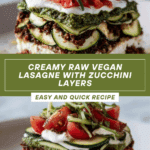Raw Vegan Lasagne Recipe
Introduction
This Raw Vegan Lasagne is a refreshing twist on a classic favorite, packed with vibrant, fresh flavors and nutrient-rich ingredients. It’s perfect for those following a raw or vegan lifestyle who want a satisfying, layered dish that’s both healthy and delicious.
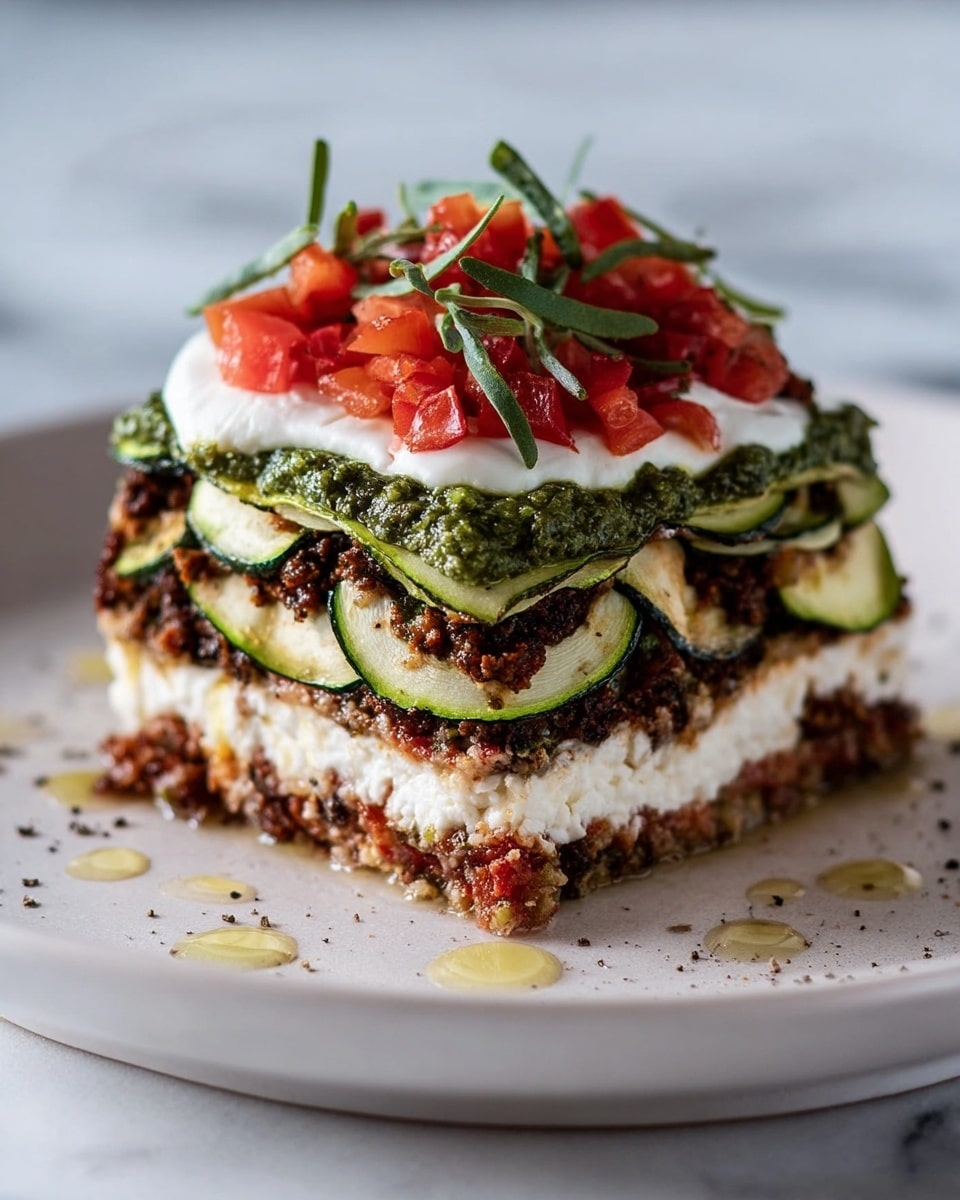
Ingredients
- 1 cup macadamias (soaked 8 hours)
- 1/2 cup water (or more as needed)
- 1/2 tsp probiotics
- 1/4 tsp salt
- 1 tsp nutritional yeast
- 1/2 tsp lemon juice
- 1 tsp onion powder
- 1/4 tsp garlic powder
- 1 cup walnuts (soaked 1 hour or more)
- 1/2 cup sun-dried tomatoes (soaked 1 hour or more)
- 1 tbsp brown miso
- 1 tbsp tamari
- 1 tsp lemon juice
- 1 1/2 cups sun-dried tomatoes (soaked 2 hours or more)
- 2 dates (Medjool are perfect)
- 2 cloves garlic
- 4 tomatoes
- 1 tbsp Italian herb mix
- 2 tbsp olive oil
- 1 tbsp lemon juice
- 2 cups tightly packed basil leaves
- 1/2 cup pine nuts
- 3 tbsp olive oil
- 1/2 tsp salt
- 1 clove garlic
- 1 tbsp lemon juice
- 2 tsp nutritional yeast
- 7 oz spinach
- 1/4 tsp salt
- 4 courgettes (zucchini)
- 10 basil leaves (cut chiffonade)
Instructions
- Step 1: Blend the macadamias, water, probiotics, 1/4 tsp salt, 1 tsp nutritional yeast, 1/2 tsp lemon juice, onion powder, and garlic powder in a high-speed blender until smooth to create the fermented cheese base.
- Step 2: Place this mixture in a strainer lined with cheesecloth and apply a gentle weight on top to press out liquid without forcing the cheese through the cloth.
- Step 3: Allow the mixture to culture for at least 24 hours but no longer than 36 hours.
- Step 4: Mix the salt, nutritional yeast, onion powder, and garlic powder into the fermented cheese. Store this cheese in a sealed container and use within a few weeks.
- Step 5: In a food processor, grind the walnuts, 1/2 cup sun-dried tomatoes, brown miso, tamari, and 1 tsp lemon juice, leaving the mixture slightly chunky to create the walnut meat layer.
- Step 6: Blend the 1 1/2 cups soaked sun-dried tomatoes, dates, garlic cloves, tomatoes, Italian herb mix, olive oil, and lemon juice in a high-speed blender until smooth to form the tomato sauce.
- Step 7: In a food processor, grind the basil leaves, pine nuts, olive oil, salt, garlic clove, lemon juice, and nutritional yeast, leaving some texture for the pesto.
- Step 8: Massage the salt into the spinach in a bowl until it wilts and releases liquid. Drain any excess liquid before layering.
- Step 9: Slice the courgettes lengthwise into thin strips to use as the lasagne “noodles.”
- Step 10: On a plate, lay down 4 overlapping courgette strips as the base layer.
- Step 11: Layer the tomato sauce, fermented cheese, walnut meat, pesto, and spinach on top of the courgettes.
- Step 12: Add two thin slices of fresh tomato over the layered ingredients.
- Step 13: Place another layer of overlapping courgette strips over the tomatoes.
- Step 14: Repeat the layering process with the tomato sauce, cheese, walnut meat, pesto, spinach, tomatoes, and courgette strips as desired to build your lasagne.
- Step 15: Garnish the top with a quenelle of fermented cheese, some diced tomatoes, freshly ground black pepper, and chiffonade basil leaves before serving.
Tips & Variations
- Soaking nuts well is key for creamy textures and easy blending.
- Adjust the tanginess of the fermented cheese with more or less lemon juice to suit your taste.
- Swap basil pesto for kale or spinach pesto for a different flavor profile.
- Use a mandoline for thinner courgette strips for easier layering.
Storage
Store the assembled lasagne in an airtight container in the refrigerator for up to 3 days. Since this dish is raw and fresh, it’s best enjoyed within that time. Reheating is not necessary, but you can bring it to room temperature before serving for enhanced flavors.
How to Serve
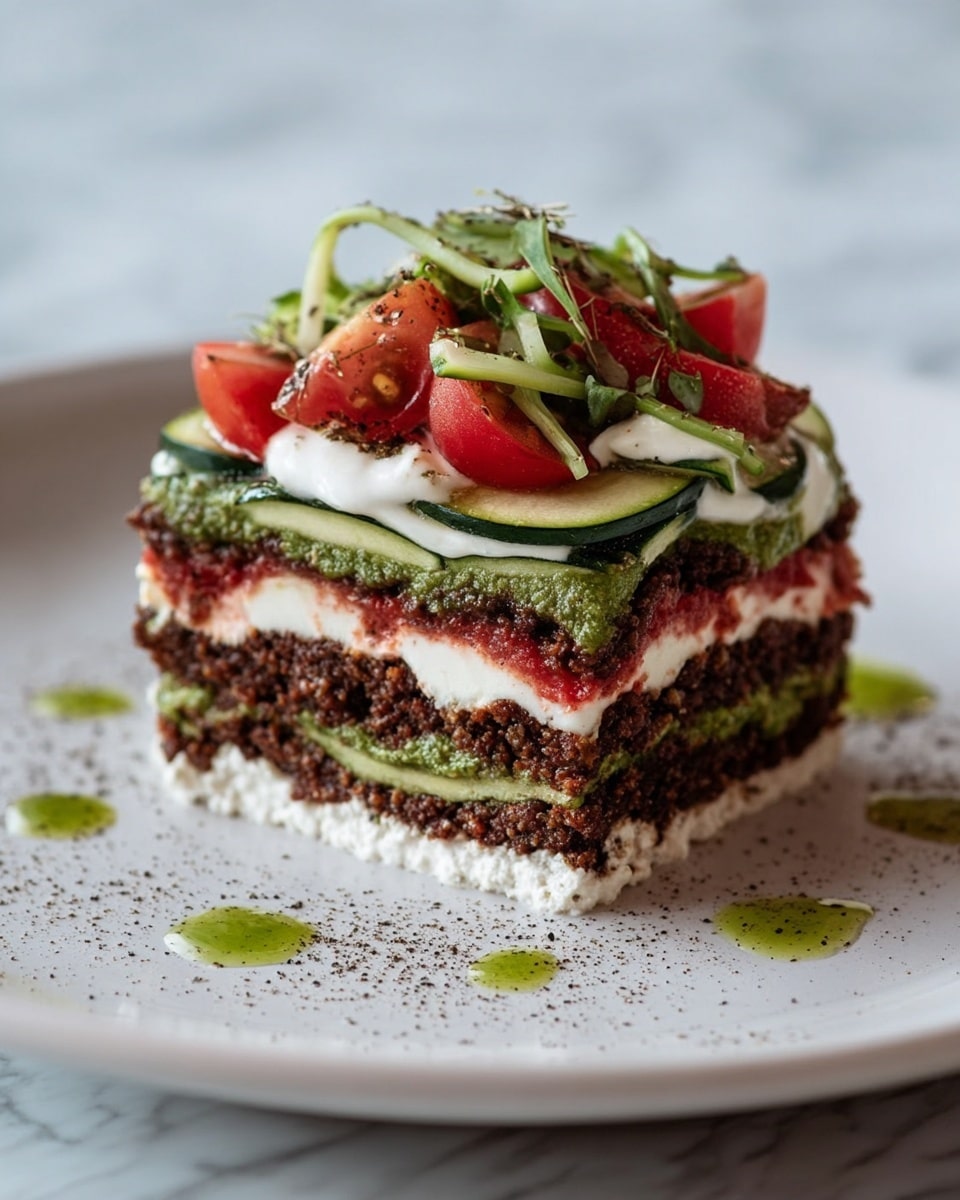
Serve this delicious recipe with your favorite sides.
FAQs
Can I make this lasagne without soaking the nuts?
Soaking the nuts softens them, making blending smoother and the cheese creamier. It’s recommended for the best texture, but if short on time, you can soak them in warm water for at least 1 hour.
Is it necessary to ferment the cheese mixture?
Fermentation adds a tangy depth and probiotics, enhancing flavor and digestibility. If you prefer, you can skip this step, but the final taste will be less complex.
PrintRaw Vegan Lasagne Recipe
This Raw Vegan Lasagne is a delightful, nutritious plant-based dish featuring layers of courgette strips, a cultured macadamia cheese, sun-dried tomato sauce, walnut meat, fresh pesto, and spinach. No cooking or baking is required, making it a fresh, flavorful, and healthful meal that’s perfect for raw food enthusiasts and those seeking creative vegan options.
- Prep Time: 15 minutes (plus 8 hours soaking nuts, 1-2 hours soaking sun-dried tomatoes, and 24-36 hours culturing)
- Cook Time: 0 minutes
- Total Time: Approximately 15 hours active time plus overnight soaking and culturing
- Yield: 10 servings 1x
- Category: Main Course
- Method: No-Cook
- Cuisine: Vegan, Raw Food
- Diet: Vegan, Gluten Free
Ingredients
Cultured Macadamia Cheese
- 1 cup macadamias (soaked 8 hours)
- 1/2 cup water (or more as needed)
- 1/2 tsp probiotics
- 1/4 teaspoon salt
- 1 tsp nutritional yeast
- 1/2 tsp lemon juice
- 1 tsp onion powder
- 1/4 tsp garlic powder
Walnut Meat
- 1 cup walnuts (soaked 1 hour or more)
- 1/2 cup sun-dried tomatoes (soaked 1 hour or more)
- 1 tbsp brown miso
- 1 tbsp tamari
- 1 tsp lemon juice
Sun-Dried Tomato Sauce
- 1 1/2 cups sun-dried tomatoes (soaked 2 hours or more)
- 2 dates (Medjool preferred)
- 2 cloves garlic
- 4 tomatoes
- 1 tbsp Italian herb mix
- 2 tbsp olive oil
- 1 tbsp lemon juice
Pesto
- 2 cups tightly packed basil leaves
- 1/2 cup pine nuts
- 3 tbsp olive oil
- 1/2 tsp salt
- 1 clove garlic
- 1 tbsp lemon juice
- 2 tsp nutritional yeast
Spinach Mixture
- 7 oz spinach
- 1/4 teaspoon salt
Assembly
- 4 courgettes (zucchini), sliced into thin strips
- 10 basil leaves (cut chiffonade)
Instructions
- Prepare the Cultured Macadamia Cheese: Blend all cultured cheese ingredients (macadamias, water, probiotics, salt, nutritional yeast, lemon juice, onion powder, and garlic powder) in a high-speed blender until completely smooth.
- Strain and Culture: Transfer the blended mixture into a strainer lined with cheesecloth. Place a weight on top—heavy enough to gently press and start removing liquid but not so heavy as to push the cheese through the cloth. Leave to culture for at least 24 hours and no longer than 36 hours at room temperature.
- Season the Cheese: After culturing, mix in salt, nutritional yeast, onion powder, and garlic powder to enhance flavor. Store the finished cheese in a sealed container in the refrigerator for up to a few weeks.
- Prepare the Walnut Meat: Grind walnuts, soaked sun-dried tomatoes, brown miso, tamari, and lemon juice in a food processor until slightly chunky, preserving some texture.
- Make the Sun-Dried Tomato Sauce: Blend soaked sun-dried tomatoes, dates, garlic, fresh tomatoes, Italian herb mix, olive oil, and lemon juice in a high-speed blender until smooth and saucy.
- Prepare the Pesto: Grind basil leaves, pine nuts, olive oil, salt, garlic, lemon juice, and nutritional yeast in a food processor, ensuring some chunkiness remains to keep a desirable texture.
- Prepare the Spinach: In a bowl, combine spinach with salt and massage it until the spinach wilts and releases most of its liquid. Drain off any excess liquid.
- Assemble the Lasagne – First Layer: On a serving plate, lay out 4 thin courgette (zucchini) strips, slightly overlapping to form the first layer.
- Add Layers: Spread a layer of sun-dried tomato sauce over the courgette strips, then add a layer of cultured macadamia cheese, followed by the walnut meat mixture. Next, spread pesto on top and then add a layer of wilted spinach.
- Add Tomato Slices: Place two thin slices of fresh tomato on top of the spinach layer.
- Second Layer of Courgette: Add another layer of slightly overlapping courgette strips on top of the tomato slices.
- Repeat Filling Layers: Repeat the layering process—sun-dried tomato sauce, cultured cheese, walnut meat, pesto, spinach, and tomato slices—followed again by courgette strips as a topping layer.
- Garnish: Finish by garnishing the lasagne with a quenelle of cultured cheese, some finely diced fresh tomatoes, a few turns of freshly ground black pepper, and a sprig or chiffonade of basil leaves for freshness and color.
Notes
- Ensure macadamias and walnuts are soaked adequately to soften and improve blending and digestibility.
- Probiotic culture times vary slightly—24 to 36 hours is ideal to develop flavor and texture.
- Use high-speed blender for creamy textures in cheese and sauce.
- Soaking sun-dried tomatoes in water softens them, helping them blend smoothly.
- Keep some texture in walnut meat and pesto by pulsing in a food processor instead of blending completely smooth.
- Courgette strips replace pasta sheets keeping the dish raw and gluten-free.
- Store leftover cheese in an airtight container in the refrigerator for several weeks.
- This recipe requires planning ahead due to soaking and culturing times.
Keywords: raw vegan lasagne, raw lasagna, vegan lasagna, no-cook lasagna, raw food recipe, vegan main course, plant-based lasagna, raw zucchini lasagna

